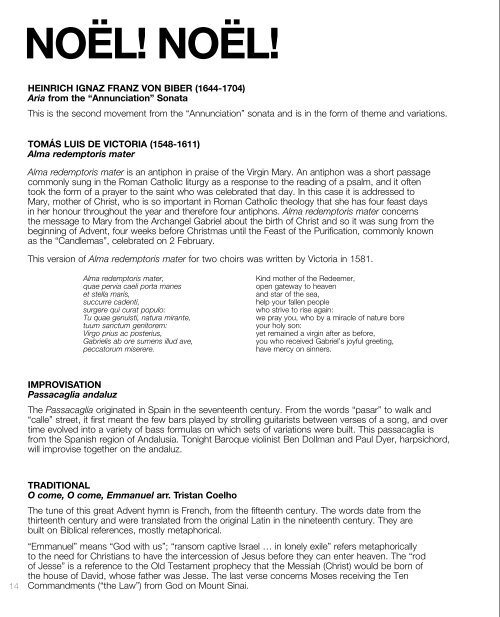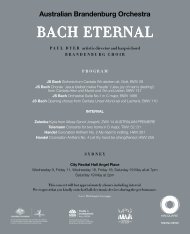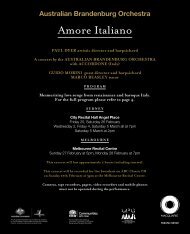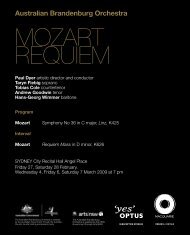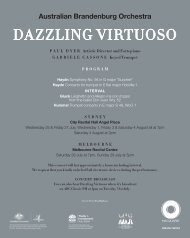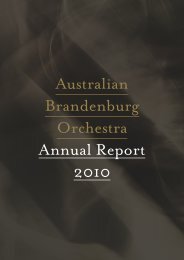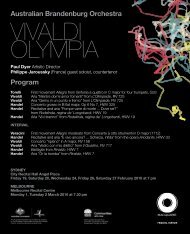download PDF program - Australian Brandenburg Orchestra
download PDF program - Australian Brandenburg Orchestra
download PDF program - Australian Brandenburg Orchestra
Create successful ePaper yourself
Turn your PDF publications into a flip-book with our unique Google optimized e-Paper software.
noËl! noËl!<br />
Heinrich Ignaz Franz von Biber (1644-1704)<br />
Aria from the “Annunciation” Sonata<br />
This is the second movement from the “Annunciation” sonata and is in the form of theme and variations.<br />
Tomás Luis de Victoria (1548-1611)<br />
Alma redemptoris mater<br />
Alma redemptoris mater is an antiphon in praise of the Virgin Mary. An antiphon was a short passage<br />
commonly sung in the Roman Catholic liturgy as a response to the reading of a psalm, and it often<br />
took the form of a prayer to the saint who was celebrated that day. In this case it is addressed to<br />
Mary, mother of Christ, who is so important in Roman Catholic theology that she has four feast days<br />
in her honour throughout the year and therefore four antiphons. Alma redemptoris mater concerns<br />
the message to Mary from the Archangel Gabriel about the birth of Christ and so it was sung from the<br />
beginning of Advent, four weeks before Christmas until the Feast of the Purification, commonly known<br />
as the “Candlemas”, celebrated on 2 February.<br />
This version of Alma redemptoris mater for two choirs was written by Victoria in 1581.<br />
Alma redemptoris mater,<br />
quae pervia caeli porta manes<br />
et stella maris,<br />
succurre cadenti,<br />
surgere qui curat populo:<br />
Tu quae genuisti, natura mirante,<br />
tuum sanctum genitorem:<br />
Virgo prius ac posterius,<br />
Gabrielis ab ore sumens illud ave,<br />
peccatorum miserere.<br />
Kind mother of the Redeemer,<br />
open gateway to heaven<br />
and star of the sea,<br />
help your fallen people<br />
who strive to rise again:<br />
we pray you, who by a miracle of nature bore<br />
your holy son:<br />
yet remained a virgin after as before,<br />
you who received Gabriel’s joyful greeting,<br />
have mercy on sinners.<br />
Improvisation<br />
Passacaglia andaluz<br />
The Passacaglia originated in Spain in the seventeenth century. From the words “pasar” to walk and<br />
“calle” street, it first meant the few bars played by strolling guitarists between verses of a song, and over<br />
time evolved into a variety of bass formulas on which sets of variations were built. This passacaglia is<br />
from the Spanish region of Andalusia. Tonight Baroque violinist Ben Dollman and Paul Dyer, harpsichord,<br />
will improvise together on the andaluz.<br />
O come, O come, Emmanuel,<br />
And ransom captive Israel,<br />
That mourns in lonely exile here<br />
Until the Son of God appear.<br />
Rejoice! Rejoice! Emmanuel<br />
Shall come to thee, O Israel.<br />
O come, thou Rod of Jesse, free<br />
Thine own from Satan's tyranny.<br />
From depths of Hell Thy people save<br />
And give them victory o'er the grave.<br />
Rejoice! Rejoice! Emmanuel<br />
Shall come to thee, O Israel.<br />
O come, O come, Thou Lord of might,<br />
Who to Thy tribes, on Sinai's height,<br />
In ancient times did'st give the Law,<br />
In cloud and majesty and awe.<br />
Rejoice! Rejoice! Emmanuel<br />
Shall come to thee, O Israel.<br />
Traditional<br />
The Coventry Carol arr. Tristan Coelho<br />
This song comes from a fourteenth-century Coventry mystery play, the Pageant of the Shearmen and<br />
Tailors. The play tells the Christmas story, ending with the “Slaughter of the Innocents” ordered by Herod<br />
when he was told of the birth of a child who would become the most powerful ruler in the world. This song<br />
was added to the play in the sixteenth century, and was reconstructed from an engraving after the original<br />
manuscript was destroyed by fire in the nineteenth century. The song comes at the end of the play and is sung<br />
by the mothers of Bethlehem to quieten their children, so Herod’s men will not hear them and murder them.<br />
Lully, lulla, thou little tiny child,<br />
By, by, lully, lullay.<br />
O sisters two,<br />
How may we do<br />
For to preserve this day<br />
This poor youngling<br />
For whom we do sing:<br />
‘by, by lully, lullay’<br />
Herod the King<br />
In his raging<br />
Charged he hath this day<br />
His men of might<br />
In his own sight<br />
All young children to slay.<br />
That woe is me,<br />
Poor child, for thee<br />
And ever morne* and say<br />
For thy parting<br />
Neither say nor sing:<br />
‘By, by, lully, lullay.’<br />
*grieve and sigh<br />
Traditional<br />
O come, O come, Emmanuel arr. Tristan Coelho<br />
The tune of this great Advent hymn is French, from the fifteenth century. The words date from the<br />
thirteenth century and were translated from the original Latin in the nineteenth century. They are<br />
built on Biblical references, mostly metaphorical.<br />
“Emmanuel” means “God with us”; “ransom captive Israel … in lonely exile” refers metaphorically<br />
to the need for Christians to have the intercession of Jesus before they can enter heaven. The “rod<br />
of Jesse” is a reference to the Old Testament prophecy that the Messiah (Christ) would be born of<br />
the house of David, whose father was Jesse. The last verse concerns Moses receiving the Ten<br />
Commandments (“the Law”) from God on Mount Sinai.<br />
Maurizio Cazzati (1616-1678)<br />
Sonata No 1 Opus 18 “La Strozza”<br />
14 Ben Dollman, Period Violin<br />
15<br />
Allegro<br />
Grave<br />
Vivace<br />
In the 1660s Cazzati was maestro di cappella of the church of San Petronio, Bologna, which under his direction<br />
became a centre of vocal and instrumental music renowned throughout Italy and Europe. This sonata is thought<br />
to be named for the Venetian poet Giulio Strozzi or for his daughter the composer Barbara Strozzi. It was written<br />
for two soprano instruments, but today the solo parts are being played by cornett and saxophone.


